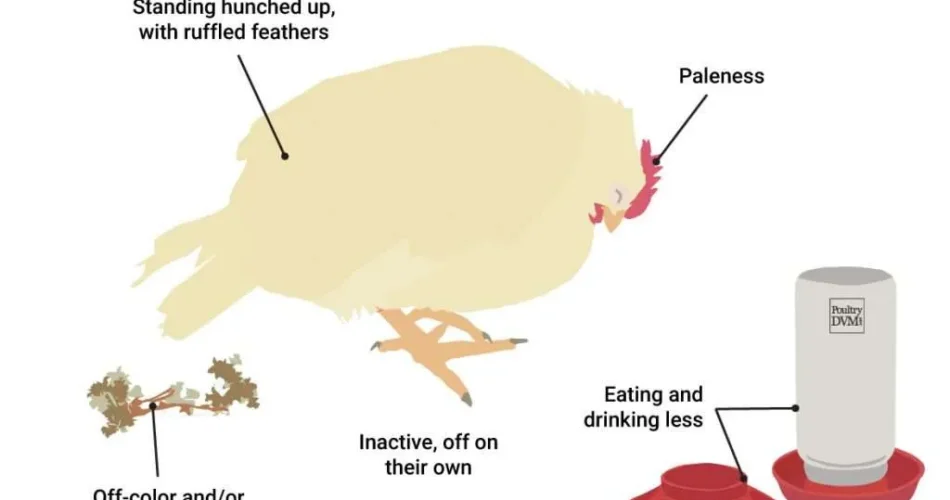What Is Coccidiosis?
Coccidiosis is a parasitic disease caused by a protozoan parasite called Eimeria. This parasite can infect many animals, including chickens, pigeons, turkeys and cattle. The most common type that affects chickens is Eimeria tenella which causes acute coccidiosis. Coccidia are able to penetrate the intestinal wall and spread throughout the body causing severe illness in young birds.
Coccidiosis may be found in almost any breed of chicken but it is more common in fast growing strains such as broilers or Cornish-Rock cross broilers due to their higher metabolism which causes them to absorb nutrients faster than their bodies can handle.
Acute vs. chronic coccidiosis
Coccidiosis is a disease caused by a tiny parasite called coccidia. There are many different types of coccidia, but the most common ones that affect chickens are Eimeria spp.
When you have acute coccidiosis, your chicken will show symptoms for about two weeks and then recover fully. Her eggs will be non-viable during this time, which means they will never hatch into chicks (and if they did hatch, there would be no way for baby chicks to survive).
Chronic coccidiosis is less common than acute coccidiosis and occurs when a chicken has a slow-growing version of Eimeria parasites in their intestines. It can cause weight loss and poor growth in young hens as well as diarrhea in adults. This condition can be fatal if not treated immediately!
So, what symptoms should you look for if you suspect your flock might have coccidiosis?
- Lack of appetite or refusal to eat or drink
- Diarrhea
- Coughing and sneezing (coccidiosis can cause respiratory problems similar to coccidioidomycosis, or Valley Fever)
1. Loss of appetite or refusal to eat or drink
Loss of appetite or refusal to eat or drink is a common sign of coccidiosis. This can occur within hours, so it’s important to pay attention and investigate if your chickens have lost their appetites.
The loss of appetite is actually not the only symptom that you may see when your chicks have coccidiosis; other symptoms include:
- Coughing
- Diarrhea or watery droppings that are yellowish-white in color (sometimes with blood)
- Loss of energy and lethargy
5. Diarrhea
Diarrhea is a symptom of coccidiosis, but it can also be a sign of other illnesses.
Your chicken may have diarrhea if he or she has been stressed, eating something that disagrees with them or has an infection. Your chicken may also have diarrhea as a result of parasites or other diseases and infections.
If your chicken has been infected with coccidiosis, they will likely experience severe watery diarrhea that is often yellowish-green in color and thick in consistency.
6. Coughing and sneezing (coccidiosis can cause respiratory problems similar to coccidioidomycosis, or Valley Fever)
Coughing and sneezing (coccidiosis can cause respiratory problems similar to coccidioidomycosis, or Valley Fever)
If your chicken is coughing or sneezing, it could be because of a respiratory condition. This is often mistaken for a cold, but it’s actually called coccidiosis. Coccidiosis is caused by protozoa that live in the intestinal tract of chickens. They can spread when an infected bird passes them through its feces onto food or water dishes. If you notice that your chicken seems to be short of breath, has nasal discharge and trouble breathing—even though she doesn’t have a fever—it could be due to an illness like Valley Fever (often called coccidia).
7. Respiratory distress and rapid breathing
- Respiratory problems are a common side effect of coccidiosis.
- Coccidiosis can cause difficulty breathing, wheezing and coughing.
- Coccidiosis is often accompanied by respiratory distress.
9. Drowsiness or lethargy
- Drowsiness or lethargy
This is one of the most common signs of coccidiosis in chickens. If a chicken appears to be less active than normal, it could be suffering from this disease.
If you see signs of coccidiosis in chickens, treat them quickly with sulfa drugs and electrolytes, which you can buy online or from a feed store.
If you see signs of coccidiosis in your chickens, treat them quickly with sulfa drugs and electrolytes. You can buy these online or from a feed store. The medicines should be given to chickens for at least two weeks to kill the parasite.
The best way to prevent and treat coccidiosis is by providing your chickens with plenty of fresh water, clean bedding and food that’s free from harmful bacteria.
